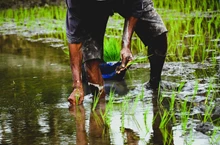
With the aim to double farmer's income by 2022, the Modi government is bringing big schemes for them. Recently, the Centre has given Diwali gift to all the farmers of the country. The Cabinet Committee on Economic Affairs (CCEA), chaired by Prime Minister Narendra Modi had increased the Minimum Support Price (MSP) of all rabi crops for the financial year 2019-20, which is to be marked for the Rabi marketing season 2020-2021. By approving the MSP of Rabi crops, the government has tried to bring the average cost of production to one and a half times, which was announced by the government in the Union Budget 2018-19.
Through this MSP policy, the government has made a major and progressive step to improve the livelihood by aiming to provide minimum 50 percent benefit to farmers and doubling their income by 2022.
For the Rabi Marketing session 2020-2021, the highest MSP recommended was lentil (Rs 325 per quintal) followed by safflower (Rs 270 per quintal) and gram (Rs 255 per quintal) to increase farmer's income. It is an important step in the direction of the MSP of white mustard and mustard has been increased by Rs 225 per quintal.
The MSP of both wheat and barley has been increased by 85 rupees per quintal. This will give wheat farmers back about 109 percent of the cost (see table below). Cost on production is a major factor in determining MSP. In this year's MSP of RMS 2020-21 for rabi crops will give farmers a 50 percent higher return on average production costs (excluding safflower). The return for wheat is 109 percent of India's weighted average production cost, 66 percent for barley, 74 percent for gram, 76 percent for lentils, 90 percent for white mustard and 50 percent for safflower.

Comprehensive cost, which includes the cost of all payments such as hired man labor / hour, labor done by oxen / labor done by machine, payment of rent of leased land, seeds, fertilizers, fertilizers, irrigation. Spending, implementation and depreciation on agricultural buildings, interest on working capital, expenditure on diesel and electricity for operation of pump sets, implementation and depreciation on agricultural buildings, working capital. The interest expense on diesel and electricity for the operation of the pump sets the value of miscellaneous expenses and family labor include reducing etc.
In the case of cereals, FCI and other designated state agencies will continue to provide support prices to farmers. State governments will undertake procurement of granulated (coarse) grains with the prior approval of the Government of India and distribute this quantity of the entire purchase under NFSA. Subsidy will be provided only for the amount released under NFSA. NAFED, SFAC and other designated central agencies will continue to procure pulses and oilseeds. The losses incurred by the nodal agencies in such work can be fully reimbursed by the government under the guidelines.

With a view to formulate adequate policy to provide income security to farmers, the government's approach has changed from production-centric to income-centric. In order to improve the income of farmers, a decision was taken to increase the scope of the Prime Minister Kisan Samaan Nidhi (PM-Kisan) scheme in the first Union Cabinet meeting held on 31 May 2019. The PM-Kisan Yojana was announced in the interim budget for the financial year 2019-2020, under which those who had land up to 2 acres of land were brought, under which they decided to provide them Rs 6000 annually by the government. went.
Another scheme "Pradhan Mantri Annadata Income Protection Campaign" was announced by the government itself in 2018, under which farmers were to be paid the right amount of their produce. Three other sub-schemes like Price Support Scheme (PSS), Price Reduction Payment Scheme (PDPS) and Private Purchase and Storage Scheme (PPSS) were included on pilot basis under this scheme.











